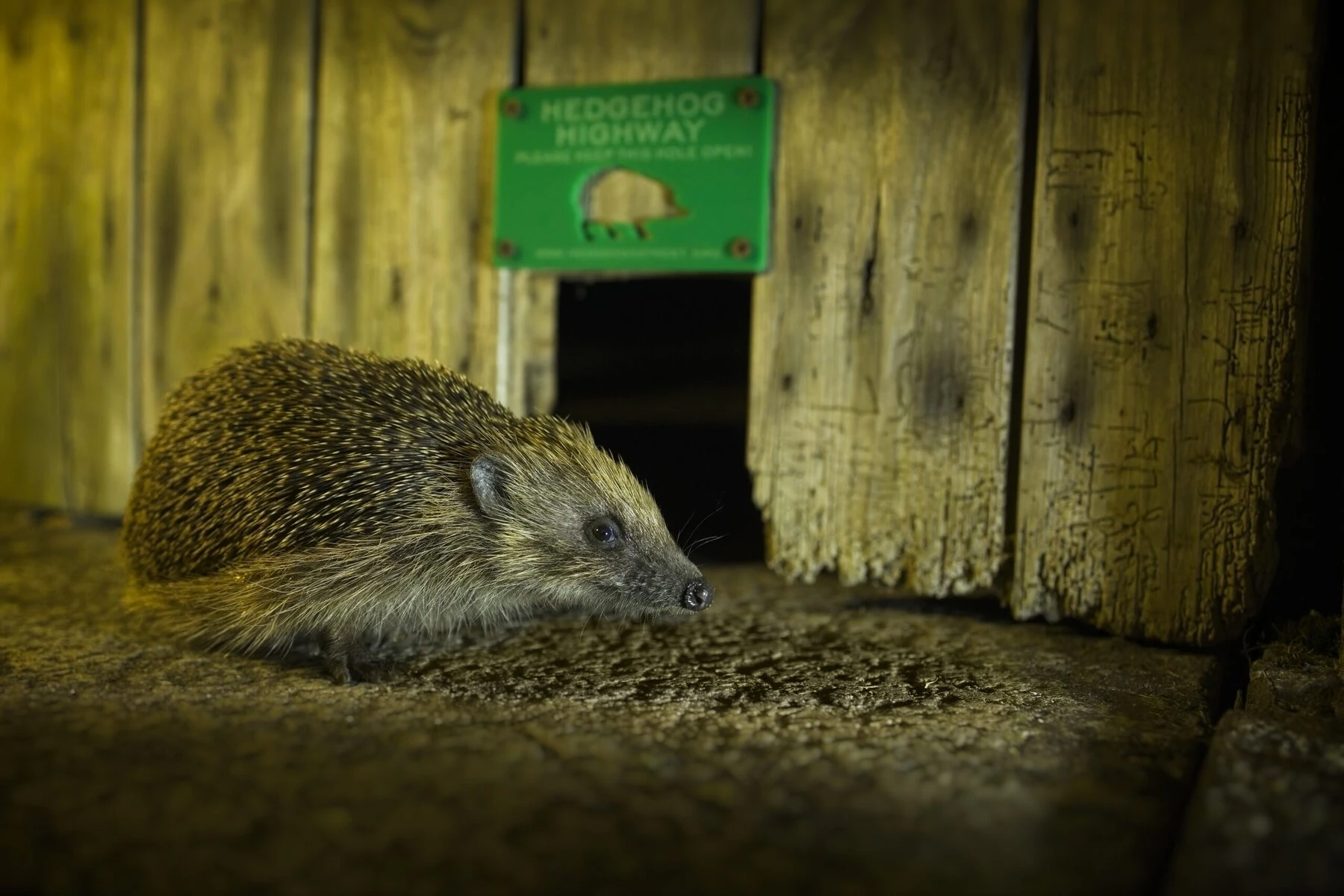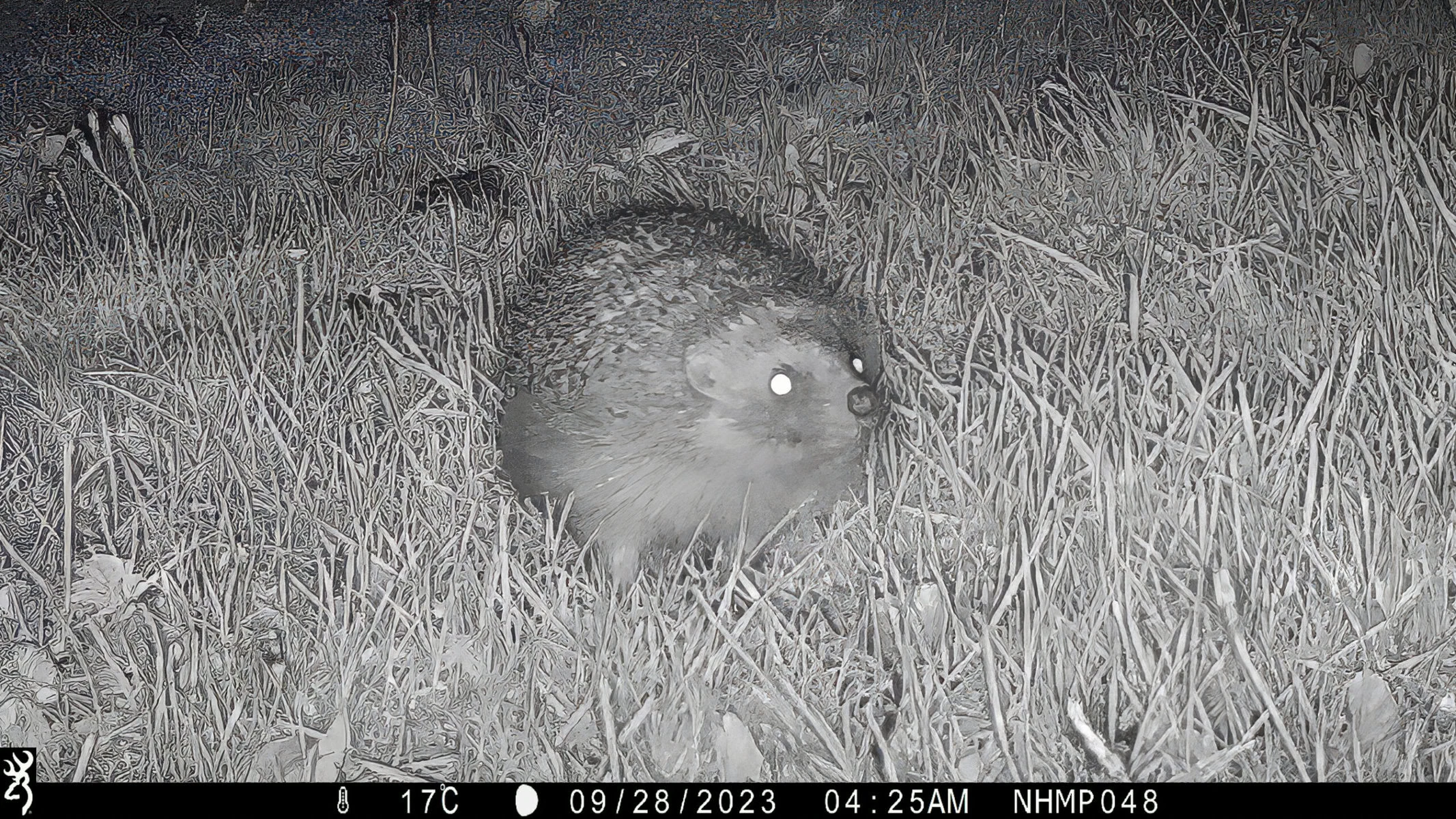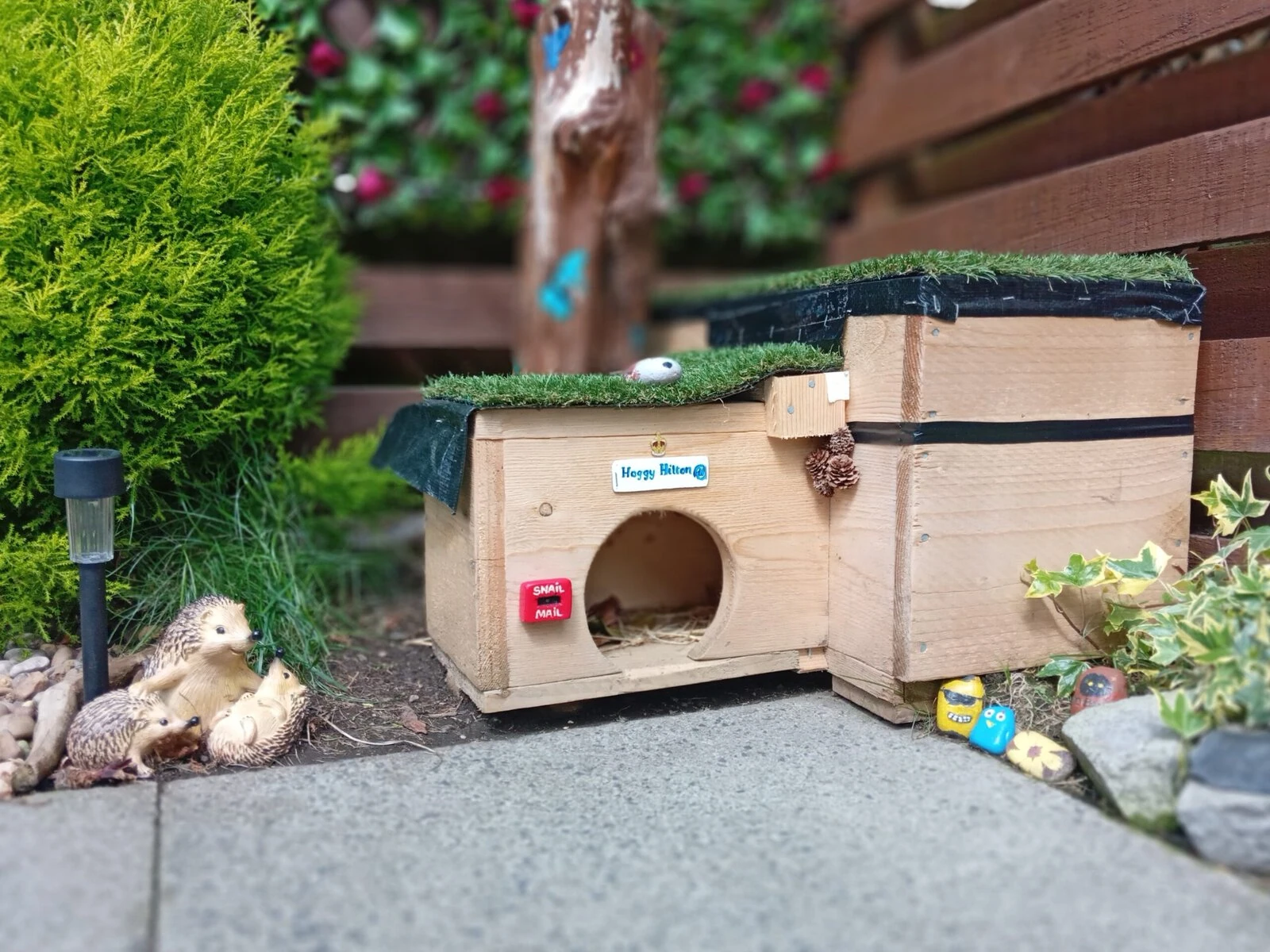When Judy Oliphant, an English nurse living in the southwestern county of Devon, stumbled upon a family of hedgehogs in her stable one day, she was surprised. The small, spiny animals were becoming a rare sight in the countryside. She quickly covered the family back up with the wood shavings they’d nestled under, but when she went back the next day, she found the babies scattered around the barn and squeaking shrilly. The mother was nowhere to be seen, and Oliphant soon discovered that she had been hit by a car on a nearby road.
“It was the first night that my partner, Alan, had moved in with me,” she remembers. “We had a slap-up meal [prepared] and a bottle of prosecco in the fridge, chilling nicely, but instead of a nice romantic meal and an evening together, we were sat up in bed with an eardropper and two blobs that we were trying to feed and toilet all through the night.”
That was 18 years ago. Since nursing those two orphaned hoglets through the night, Oliphant has rescued thousands of hedgehogs — and any other sick or injured mammal or bird brought to her. In 2020 she and her partner, Alan Pook, founded Prickles in a Pickle, a hedgehog rescue and rehabilitation center that runs with the help of more than 40 volunteers.
These days more and more British hedgehogs need rescuing. They may be covered in sharp spines, but that’s no defense against the habitat loss and fragmentation that’s primarily driving the species’ significant decline across the UK. And their spines are certainly no match for cars, another frequent killer of hedgehogs in both rural and urban areas. Although it’s difficult to glean exact numbers, scientists estimate that Britain has lost about a third of its hedgehogs since 2000.
In the last few years, however, there’s been increased public awareness of their plight — and an upwelling of support for hedgehog conservation, particularly in towns and cities. In urban areas, hedgehogs love to travel between gardens, where there are usually plenty of insects to feed on and nooks to hide in. But with most gardens surrounded by fences and walls, hedgehogs can’t gain access to those critical refuges.
Give them any kind of opening, however, and hedgehogs will squeeze their way in. So a major prong of the hedgehog conservation strategy is to cut tiny holes in garden fences, which allows hedgehogs to come and go as they please. Connecting urban gardens this way creates what are known as hedgehog “highways” — and they’ve been spreading across British towns and cities. A 2021 study estimated that more than 120,000 such highways connected about 240,000 gardens across the UK, which amounts to about one percent of all residential gardens in the country.
Weighed down by negative news?
Our smart, bright, weekly newsletter is the uplift you’ve been looking for.
Because gardens make up nearly a third of Britain’s urban areas, creating hedgehog highways can substantially increase the amount of habitat available to hedgehogs. In 2022, a study found that these corridors may be helping urban hedgehog populations recover their numbers.
“After a long historic decline on the urban side, we found that [it] was starting to slow down and level off, and [there have been] very early signs of improvement,” says Grace Johnson, an ecologist with Hedgehog Street, a campaign that advocates for hedgehog-friendly urban environments.
“We can’t say that we’ve saved hedgehogs or anything like that,” Johnson says. “They’re not back up to the numbers where they should be, but it’s a little bit of good news.”

Rural hedgehogs face threats related to agricultural intensification, such as insecticide use (which kills off the insects they rely upon for food) and the removal or degradation of hedgerows. A once-traditional feature of the English countryside, hedgerows provide the animals’ preferred habitat — and the origin of their name. Roads also present a danger, and another reason why rural hedgehog populations have continued to decline.
Urban hedgehogs also have to worry about getting hit by cars, of course, but they face another set of dangers lurking in their preferred habitat. If they can gain access to urban gardens, hedgehogs must dodge rat poison, mouse traps, hostile dogs and cats, and energetic gardeners wielding lawn mowers, string trimmers, and rakes. It’s common for hedgehogs’ nests to be disturbed by these garden implements, or even lit on fire, if the nest they’ve selected is a dry pile of kindling. They must also look out for garden ponds: Hedgehogs can swim, but they can’t scale walls, and any steep-sided pond or pool without a ramp leading out can turn into a watery grave. Soccer goal nets, in which hedgehogs can get hopelessly tangled, present another challenge.
“I say to people that hedgehogs will find some new way of killing themselves every year,” says Oliphant. “Every year we get something new, and we think, ‘Oh, my goodness! How did they manage to do that?’”
In addition to hedgehog highways, the Hedgehog Street campaign (and other hedgehog conservationists) encourages hog-friendly practices that homeowners can adopt to help prevent these sorts of untimely ends. And the response has been enthusiastic, from individual homeowners to schools, soccer leagues and even developers who have committed to incorporating hedgehog holes into the fencing on all new developments.
“It’s been going really well,” says Johnson. “There’s certainly that awareness, if not of Hedgehog Street, then of hedgehog highways. A lot of the time you speak to people and they know what you’re talking about, which is really good. Whereas a few years ago that wasn’t the case.”

It helps, of course, that hedgehogs are irresistibly cute, and they’ve been embedded in British culture for centuries. Shakespeare sometimes cast hedgehogs in minor roles in his plays, and they even inspired 17th-century cookbook recipes, such as one for a hedgehog-shaped pudding. (Hedgehogs themselves were rarely eaten.) They regularly top lists of Britain’s favorite species, and they’re media darlings, which has helped get the conservation message out.
Hedgehogs don’t tend to stir up conflict, either, as some species do.
“The hedgehog, it’s not a political animal,” says Oliphant. “Everybody’s got an opinion on a badger; everybody’s got an opinion on a fox. But you mention ‘hedgehog’ to most people, and they go, ‘Aww, Mrs. Tiggy-Winkle.’”
The universal popularity of hedgehogs has also helped fuel support for a new monitoring program, which aims to provide a more robust estimate of hedgehog populations across Great Britain. Data gathered so far has helped paint a picture of urban and rural populations, but not a complete one.
“We’re quite confident that hedgehogs are declining,” says Dr. Emma Cartledge, a research fellow at Nottingham Trent University who helps coordinate the monitoring program. “But by how much and where, is the question?”
As part of the program, Cartledge leads troops of volunteers to survey sites across Britain, where they set up camera traps to document the presence (or absence) of hedgehogs. More volunteers then sort through the millions of images generated, assisted by artificial intelligence, which is a first for hedgehog conservation. It’s a massive data-gathering effort that relies on the help of these citizen scientists. By 2026, when the project is scheduled to end, it will have produced information needed to help bring back Britain’s hedgehogs.

It could benefit other species as well.
“We’re capturing lots of medium-sized mammals — badgers, foxes, deer, they all trigger the camera,” explains Cartledge. “So there’s a wealth of data there that could be used.”
The hope, she says, is that the data, combined with the AI-powered model they’re using to generate hedgehog population estimates, could be applied to other species and inform conservation strategies for them.
In the meantime, hedgehog highways continue to grow across the UK. And although they may still bump into danger in people’s gardens, hedgehogs are increasingly likely to find specially built hedgehog “homes” in those gardens, replete with food and water stations and often lovingly decorated. Other hedgehog-friendly gardens simply feature an old hollow log, an undisturbed leaf pile, or an overgrown corner where hedgehogs can shelter.
“I say, if we all look after our own little patch with the creatures we have to share them with in mind,” says Oliphant, “and those patches start to link up and grow, that’s going to save wildlife.”
The post The Hidden World of ‘Hedgehog Highways’ appeared first on Reasons to be Cheerful.




